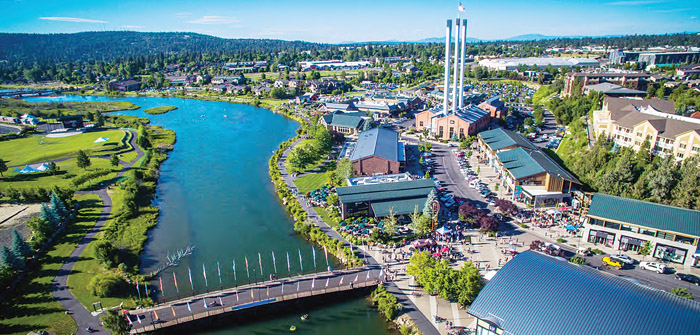We’ve been challenged by the smoke over the past few weeks. Not wanting to go outside and frequent our regular shopping and eating establishments. On top of the fires seemingly coming from every direction, the eclipse ‘incident’ was a disappointment: expectations in Bend and Sisters were high that hundreds of visitors would converse on our towns and retailers and restaurants would be packed.
Yet, nothing happened. For the bulk of eclipse watching most went to Prineville and Madras, but even in those towns the expectations were higher than the result. Except for a couple days in Prineville, even the traffic was lower than anticipated.
The result, especially the sad cancellation of the renowned Sisters Folk Festival that generates $1.2 million for the Sisters economy each year, is that local retail and eating establishment are hurting.
TIME TO SHOP LOCAL LIKE YOU NEVER DID BEFORE
The impact it can have on our economy is enormous. When you shop at local establishments (rather than sitting at home and ordering from a catalog or online) all of the money you spend stays right here in this community. It means strengthening our economic vitality, which benefits every single person around you.
However, we challenge you to go even a step further and begin by reading the labels when you shop for everyday things and see what you can find that is made in the USA — the job you save may be your own or your neighbors.
An appealing aspect of buying from a local merchant is the ability to receive personal service and direct contact with a company that backs up its products.
Don’t forget to think food. Most produce in the U.S. is picked four to seven days before being placed on supermarket shelves and is shipped for an average of 1,500 miles before being sold. And this is when you consider only U.S. grown products. Those distances are substantially longer when we factor produce imported from Mexico, Asia, Canada, South America and other places.
We purchase imported fresh food to the detriment of small farmers by subsidizing large scale, agribusiness-oriented agriculture with government handouts and artificially cheap energy. If you’re not dining out, buy farm to table products, locally grown food whenever possible. See www.AgriculturalConnections.com. Check out the market for Central Oregon Locavore. The permanent indoor Farmers Market in Bend at 1216 NE First Street houses products from over 250 local farmers and food producers or use the online marketplace at orders@centraloregonlocavore.org.
By choosing local and independent businesses for your services, shopping, dining and other needs, you not only get real value and personal service, you’re helping to grow and sustain our regional economy.
THINK LOCAL – BUY LOCAL – BE LOCAL
1. Support yourself: Several studies have shown that when you buy from an independent, locally owned business, rather than a nationally owned businesses, significantly more of your money is used to make purchases from other local businesses, service providers and farms — continuing to strengthen the economic base of the community. Studies show that locally-owned businesses generate a premium in enhanced economic impact to the community and our tax base.
2. Support local community groups: The impact that local nonprofits have on creating a healthy environment for at-risk youth and families is beyond measure. Local businesses can help to assure their success.
3. Keep our community unique: Where we shop, where we eat and have fun — all of it makes our community home. One-of-a-kind businesses are an integral part of the distinctive character of Central Oregon. Tourism businesses benefit when people go on vacation, they seek out destinations that offer them the sense of being someplace unique.
4. Reduce environmental impact: Locally owned businesses can make more local purchases requiring less transportation and generally set up shop in town or city centers as opposed to developing on the fringe. This means contributing less to sprawl, congestion, habitat loss and pollution.
5. Create more jobs: Small local businesses are the largest employer nationally and in our community, providing the most jobs to residents.
6. Get better service: Local businesses hire and train people with a better understanding of the products they are selling and take more time to get to know customers.
7. Invest in community: Local businesses are owned by people who live in this community, are less likely to leave and are more invested in the region’s future.
8. Put your taxes to good use: Local businesses require comparatively little infrastructure investment and make more efficient use of public services as compared to nationally owned stores entering the community.
9. Buy what you want, not what someone wants you to buy: A marketplace of tens of thousands of small businesses is the best way to ensure innovation and low prices over the long-term.
10. Encourage local prosperity: A growing body of economic research shows that in an increasingly homogenized world, entrepreneurs and skilled workers are more likely to invest and settle in communities that preserve their one-of-a-kind businesses and distinctive character. pha
Share.
Shopping Local — Fires/Smoke/Eclipse Create Economic Challenges
0
Share.





